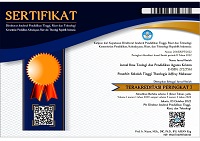Pedagogi di Era Digital dalam Konteks Pandemi Covid-19
Abstract
Masalah pandemi COVID-19 membuat proses belajar dan mengajar tidak dapat dilaksanakan dengan tatap muka lagi, maka dialihkan menjadi proses belajar dan mengajar jarak jauh atau online. Hal ini mengakibatkan pedagogi juga mengalami perubahan, termasuk para pendidik dalam melaksanakan proses belajar dan mengajar. Tujuan penelitian ini adalah untuk mendapatkan konsep pedagogi yang tepat agar dapat diimplementasikan pada masa pandemi Covid-19. Menggunakan metodologi penelitian kualitatif; melakukan analisis kualitatif dengan memilih dan meneliti tujuh konsep perkembangan pedagogi terbaru di era digital dan hasil penelitian dari jurnal-jurnal dalam lima tahun terakhir. Dari hasil penelitian dapat disimpulkan perlunya diterapkannya konsep baru yang relevan Pedagogi di era digital dalam konteks pandemi Covid-19 dengan mengambil nilai-nilai penting dari ketujuh konsep pedagogi yang diteliti.
Kata kunci: Digital, Konteks, Pandemic, Pedagogi, Teknologi.
The Covid-19 pandemic problem makes learning and teaching not can be implemented face-to-face again, then transferred to the process of distance learning or teaching online. This result in pedagogy also experienced changes, including educators in implementing the learning and teaching process. The purpose of this research is to get a concept appropriate pedagogy to be implemented during the Covid-19 pandemic. Using qualitative research methodologies; conduct qualitative analysis by selecting and researching seven concepts of the latest pedagogical developments in the era digital and research results from journals in the last five years. From the results research can be concluded the need to apply the new relevant concept of Pedagogy in the era digitally in the context of the pandemic Covid-19 by taking important values from the seven pedagogical concepts studied.
Full Text:
PDFReferences
Andalas, P. (2019). Connection Pedagogy: A Pedagogical Shift for Millennial Learners in the Digital Era. Proceedings of the 6th International Conference on Educational Research and Innovation (ICERI 2018), 330(Iceri 2018), 434–439. https://doi.org/10.2991/iceri-18.2019.91
Avidov-Ungar, O., & Forkosh-Baruch, A. (2018). Professional identity of teacher educators in the digital era in light of demands of pedagogical innovation. Teaching and Teacher Education, 73, 183–191. https://doi.org/10.1016/j.tate.2018.03.017
Blissenden, M. (2015). Teaching Undergraduate Law Students in the 21st Century – Pedagogy in a Technological Era. Athens Journal of Law, 1(4), 213–220. https://doi.org/10.30958/ajl.1-4-2
Bykov, V. Y., & Leshchenko, M. P. (2016). Digital Humanistic Pedagogy: Relevant Probelms of Scientific Research in the Field of Using ICT in Education. Information Technologies and Learning Tools, 53(3), 1. https://doi.org/10.33407/itlt.v53i3.1417
Chemi, T., Davy, S. G., & Lund, B. (2017). Innovative Pedagogy. In T. Chemi, S. G. Davy, & B. Lund (Eds.), Innovative Pedagogy. SensePublishers. https://doi.org/10.1007/978-94-6300-968-3
Crawford, J., Butler-henderson, K., Rudolph, J., Malkawi, B., Glowatz, M., Burton, R., & Lam, S. (2020). COVID-19: 20 countries’ higher education intra-period digital pedagogy responses. Journal of Applied Learning & Teaching, 3(1). https://doi.org/10.37074/jalt.2020.3.1.7
Creanor, L., & Walker, S. (2012). Exploring the Theory, Pedagogy and Practice of Networked Learning. In L. Dirckinck-Holmfeld, V. Hodgson, & D. McConnell (Eds.), Exploring the Theory, Pedagogy and Practice of Networked Learning. Springer New York. https://doi.org/10.1007/978-1-4614-0496-5
Daniela, L. (2019). Didactics of Smart Pedagogy. In L. Daniela (Ed.), Didactics of Smart Pedagogy: Smart Pedagogy for Technology Enhanced Learning. Springer International Publishing. https://doi.org/10.1007/978-3-030-01551-0
Elliott, D., & Spence, E. H. (2017). Ethics for a Digital Era. In Ethics for a Digital Era. John Wiley & Sons, Ltd. https://doi.org/10.1002/9781118968888
Fanreza, R. (2018). The Quality of Teachers in Digital Era. Proceedings of the 5th International Conference on Community Development (AMCA 2018). https://doi.org/10.2991/amca-18.2018.128
Fathi, M., Khakifirooz, M., & Pardalos, P. M. (Panos M. . (2019). Optimization in large scale problems Industry 4.0 and Society 5.0 applications (M. Fathi, M. Khakifirooz, & P. M. (Panos M. . Pardalos (eds.)).
Gugus Tugas. (n.d.). Beranda | Gugus Tugas Percepatan Penanganan COVID-19. Retrieved May 15, 2020, from https://covid19.go.id/
Jubas, K., Taber, N., & Brown, T. (2015). Popular Culture as Pedagogy. In K. Jubas, N. Taber, & T. Brown (Eds.), Popular Culture as Pedagogy: Research in the Field of Adult Education (Vol. 95). SensePublishers. https://doi.org/10.1007/978-94-6300-274-5
Jung, I. (2019). Open and Distance Education Theory Revised: Implications for the Digital Era (I. Jung (ed.)). Springer.
Lee, H., & Kaak, P. (Eds.). (2017). The Pedagogy of Shalom. Springer Singapore. https://doi.org/10.1007/978-981-10-2987-5
Luguetti, C., Kirk, D., & Oliver, K. L. (2019). Towards a pedagogy of love: exploring pre-service teachers’ and youth’s experiences of an activist sport pedagogical model. Physical Education and Sport Pedagogy. https://doi.org/10.1080/17408989.2019.1663499
Marsh, C., Peter, S., & Azaransky, S. (Eds.). (2016). Lived Theology: New Perspectives on Method, Style, and Pedagogy. Oxford University Press.
Menkoinfo. (n.d.). JDIH KEMKOMINFO. Retrieved May 15, 2020, from https://jdih.kominfo.go.id/produk_hukum/view/id/553/t/peraturan+menteri+komunikasi+dan+informatika+nomor+20+tahun+2016+tanggal+1+desember+2016
Merriam-Webster. (n.d.). Pedagogy. Merriam-Webster. Retrieved May 15, 2020, from https://www.merriamwebster.com/dictionary/pedagogy
Ng, W. (2015). New Digital Technology in Education. In New Digital Technology in Education: Conceptualizing Professional Learning for Educators. Springer International Publishing. https://doi.org/10.1007/978-3-319-05822-1
O’Donald, S., Hatza, N., & Springgay, S. (2015). The Knitivism Club. In Handbook of Public Pedagogy. Routledge. https://doi.org/10.4324/9780203863688.ch36
Paris, J. (2016). Teach From The Heart: Pedagogy as Spiritual Practice. Cascade Books.
Robertson, L., & Scheidler-Benns, J. (2016). Critical Media Literacy as a Transformative Pedagogy. Literacy Information and Computer Education Journal, 7(1), 2247–2253. https://doi.org/10.20533/licej.2040.2589.2016.0297
Ronda, D. (2016). Pemimpin dan Media: Misi Pemimpin Membawa Injil Melalui Dunia Digital. Jurnal Jaffray, 14(2), 189–198. https://doi.org/10.25278/jj71.v14i2.210
Sailin, S. N., & Mahmor, N. A. (2018). Improving student teachers’ digital pedagogy through meaningful learning activities. Malaysian Journal of Learning and Instruction, 15(2), 143–173.
Salgues, B. (2018). Society 5.0. In Society 5.0. John Wiley & Sons, Inc. https://doi.org/10.1002/9781119507314
Sturdevant, J. S. (2016). The Adaptable Jesus of the Fourth Gospel. In Novum Testamentum, Supplements. BRILL. https://doi.org/10.1163/9789004304239
World Health Organization. (n.d.). Coronavirus disease 2019. Retrieved May 15, 2020, from https://www.who.int/emergencies/diseases/novel-coronavirus-2019
DOI: http://dx.doi.org/10.25278/jitpk.v1i1.472
viewed = 0 times











